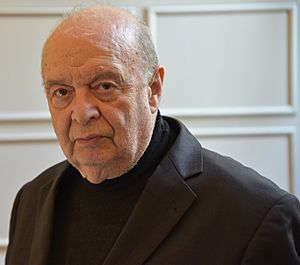Rudolf Gelbard facts for kids
Quick facts for kids
Rudolf Gelbard
|
|
|---|---|

Gelbard at the Burgtheater, Vienna in 2014
|
|
| Born | 4 December 1930 Vienna, Austria
|
| Died | 24 October 2018 (aged 87) Vienna, Austria
|
| Nationality | Austrian |
| Known for | Holocaust survivor Political campaigner |
Rudolf Gelbard (born December 4, 1930 – died October 24, 2018) was an Austrian man who survived the Holocaust. He spent his life fighting against anti-Semitism (hatred of Jewish people) and neo-Nazism (groups that follow Nazi ideas). He often spoke in schools and universities. He shared his experiences during the Holocaust to teach others. He also appeared in a film about his life.
Contents
Early Life and Surviving the Holocaust
Rudolf Gelbard was born in Vienna, Austria. His family was Jewish. When he was young, Germany took control of Austria in an event called the Anschluss. Because he was Jewish, Rudolf was not allowed to go to his school anymore.
He saw the terrible things the Nazis did to Jewish people during Kristallnacht. This was a night when Nazis attacked Jewish homes and businesses. In 1942, when Rudolf was 11, he and his parents were sent to the Theresienstadt concentration camp. This was a special camp where Nazis held many Jewish people.
Nineteen members of Rudolf's family died at Theresienstadt. But Rudolf survived because he was kept in the children's part of the camp. He was freed from the camp in 1945.
Rudolf Gelbard was married two times. His daughter from his first marriage passed away in 1972 when she was 17. His second marriage started in 1990 and lasted until he died.
Fighting for Justice and Education
After being freed from Theresienstadt, Rudolf Gelbard worked hard to stop anti-Semitism and neo-Nazi groups. In 1946, he spoke out against anti-Jewish riots at the University of Vienna. In 1955, he protested to stop a lecture that was against Jewish people.
Rudolf was part of a group called the Federation of Social Democratic Freedom Fighters. With this group, he worked to make sure schools taught about the terrible crimes the Nazis committed. He gave many talks in schools and universities. He shared his own story of surviving the Holocaust.
In 2017, a group called SOS Mitmensch shared a video of Rudolf Gelbard on Facebook. In the video, he spoke against a political party called the Freedom Party of Austria. He said this party was connected to right-wing groups and should not be in the Austrian government. The video was watched over 100,000 times.
Working Life and Media
From 1954 to 1963, Rudolf worked for the Ministry of Social Affairs in Austria. Later, he worked as a merchant, which is someone who buys and sells goods. In 1975, he became an editor for a newspaper called Kurier. He worked there until 1990. Rudolf also worked as a cultural officer for Jewish people in Austria.
In 2007, Rudolf Gelbard was featured in a documentary film about his life. The film was called The Man on the Balcony. It focused on his childhood experiences during the Holocaust and his time at Theresienstadt. While making the film, Rudolf visited Theresienstadt for the first time since he was freed in 1945.
In 2008, a writer named Walter Kohl wrote a book about Rudolf's life. The book was called The dark sides of the planet: Rudi Gelbard, the fighter. In his later years, Rudolf also acted in a play called The Last Witnesses.
Awards and Recognition
Rudolf Gelbard received several important awards for his work:
- 2005: Decoration for Services to Vienna
- 2011: Decoration of Honour for Services to the Republic of Austria
- 2016: Viktor Adler badge
Rudolf Gelbard's Passing
Rudolf Gelbard passed away on October 24, 2018, in Vienna. He was 87 years old and had been ill for some time.
Alexander Van der Bellen, the President of Austria, spoke about Rudolf's death. He said that Austria had lost an important witness of the Shoah (another name for the Holocaust). He also called Rudolf a strong voice against anti-Semitism and a dedicated fighter for democracy. Rudolf Gelbard was buried in the Vienna Central Cemetery. His grave was a special tomb of honor provided by the city.
See also
 In Spanish: Rudolf Gelbard para niños
In Spanish: Rudolf Gelbard para niños
 | Audre Lorde |
 | John Berry Meachum |
 | Ferdinand Lee Barnett |

